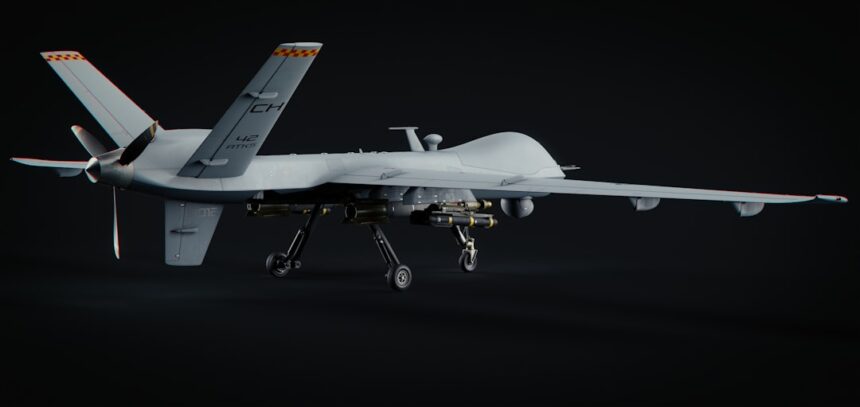Drone warfare has emerged as a significant component of modern military strategy, revolutionizing the way conflicts are conducted. The use of unmanned aerial vehicles (UAVs) allows for precision strikes and surveillance capabilities that were previously unimaginable. This technological advancement has not only changed the battlefield dynamics but has also raised complex questions about the implications of remote warfare.
As nations increasingly rely on drones for combat operations, the consequences extend beyond the immediate tactical advantages, affecting both operators and civilians in profound ways. The introduction of drone warfare has shifted the paradigm of engagement, enabling military forces to conduct operations from thousands of miles away. This distance creates a unique psychological landscape for those involved, as operators engage in combat without the physical presence of traditional warfare.
The implications of this shift are multifaceted, encompassing ethical considerations, mental health challenges, and societal impacts that warrant thorough examination. As drone technology continues to evolve, understanding its effects on individuals and communities becomes increasingly critical.
Key Takeaways
- Drone warfare has revolutionized modern warfare, allowing for remote and precise targeting of enemy combatants.
- Drone operators experience high levels of stress, anxiety, and moral injury due to the nature of their work, leading to mental health issues.
- Civilians living in areas targeted by drones suffer from trauma, anxiety, and depression, impacting their mental well-being and daily lives.
- The use of drones raises ethical concerns about the dehumanization of warfare and the potential for civilian casualties.
- PTSD and other mental health disorders are common among drone operators and civilians affected by drone warfare, requiring long-term support and resources.
The Impact on Drone Operators
Drone operators face a unique set of challenges that differ significantly from those experienced by traditional combat soldiers. While they may not be exposed to the immediate dangers of the battlefield, the psychological toll of operating drones can be substantial. The operators often find themselves in high-stress environments, making life-and-death decisions in real-time while being physically removed from the consequences of their actions.
This disconnect can lead to feelings of isolation and moral ambiguity, as they grapple with the implications of their strikes. Moreover, the nature of drone warfare often requires operators to engage in repetitive missions, which can exacerbate feelings of monotony and detachment. The constant exposure to graphic imagery and the aftermath of strikes can lead to a desensitization effect, where operators become numb to the violence they are inflicting.
This emotional detachment can create a paradox where operators feel both powerful and powerless, leading to internal conflicts that can manifest in various mental health issues over time.
The Mental Health Effects on Civilians

The impact of drone warfare extends far beyond the operators themselves; civilians living in conflict zones experience profound psychological effects as well. The constant threat of drone strikes creates an atmosphere of fear and anxiety that permeates daily life. Communities under surveillance often report heightened stress levels, as individuals live with the knowledge that they could be targeted at any moment.
This pervasive fear can lead to long-term mental health issues, including anxiety disorders and depression. Additionally, the trauma experienced by civilians is compounded by the loss of loved ones and the destruction of homes and livelihoods. Families torn apart by drone strikes often struggle with grief and loss, leading to a cycle of trauma that can affect generations.
The psychological scars left by such violence can hinder community cohesion and resilience, making recovery from conflict even more challenging. As these communities grapple with their experiences, the need for mental health support becomes increasingly evident.
The Ethical Dilemmas of Remote Warfare
| Ethical Dilemmas of Remote Warfare | Metrics |
|---|---|
| Civilian Casualties | High |
| Transparency | Low |
| Accountability | Challenging |
| Mental Health Impact on Operators | Significant |
The rise of drone warfare has brought forth a host of ethical dilemmas that challenge traditional notions of combat and accountability. One significant concern is the question of proportionality—whether the military advantage gained from a drone strike justifies the potential civilian casualties. The ability to conduct strikes remotely can lead to a detachment from the human cost of warfare, raising moral questions about the value placed on human life in conflict situations.
Furthermore, the lack of transparency surrounding drone operations complicates accountability. With operators often shielded from direct consequences, there is a risk that military actions may be taken without adequate consideration for their ethical implications. This detachment can foster a culture where decisions are made based on metrics rather than human impact, leading to a troubling normalization of violence in conflict zones.
As societies grapple with these ethical challenges, it becomes essential to establish frameworks that prioritize human rights and accountability in military operations.
PTSD and Other Mental Health Disorders
Post-Traumatic Stress Disorder (PTSD) is one of the most significant mental health issues associated with drone warfare, affecting both operators and civilians alike. For drone operators, the psychological burden of witnessing violence from afar can lead to symptoms similar to those experienced by traditional combat veterans. Flashbacks, nightmares, and heightened anxiety are common among those who have engaged in drone strikes, as they struggle to reconcile their actions with their moral beliefs.
Civilians living under the threat of drone strikes also face a heightened risk of developing PTSD. The unpredictability of attacks creates an environment where individuals are constantly on edge, leading to chronic stress responses that can manifest as anxiety disorders or depression. The cumulative effect of trauma experienced by entire communities can result in a public health crisis, necessitating comprehensive mental health interventions to address these widespread issues.
The Role of Technology in Psychological Warfare

Technology plays a pivotal role in shaping modern psychological warfare strategies, particularly in the context of drone operations. The use of drones not only allows for physical attacks but also serves as a tool for instilling fear and uncertainty among adversaries.
Moreover, advancements in technology have enabled more sophisticated methods of psychological manipulation.
This data-driven approach can enhance operational effectiveness but also raises ethical concerns about privacy and consent.
As technology continues to evolve, its role in psychological warfare will likely expand, necessitating ongoing discussions about its implications for human rights and ethical conduct in conflict.
The Dehumanization of Targets
One of the most troubling aspects of drone warfare is the dehumanization of targets that often accompanies remote operations. When operators engage with targets through screens rather than face-to-face encounters, there is a risk that they may begin to view them as mere data points rather than human beings with lives and stories. This detachment can lead to a desensitization towards violence and an erosion of empathy for those affected by military actions.
The dehumanization process is not limited to operators; it extends to how society perceives victims of drone strikes. Media portrayals often reduce individuals in conflict zones to statistics or collateral damage rather than acknowledging their humanity. This narrative can perpetuate cycles of violence and justify military actions without fully considering their impact on real lives.
Addressing this dehumanization is crucial for fostering a more humane approach to conflict resolution and ensuring that ethical considerations remain at the forefront of military strategy.
The Psychological Impact on Families and Communities
The psychological ramifications of drone warfare extend deeply into families and communities affected by conflict. When individuals are killed or injured in drone strikes, families are left to navigate grief and loss while grappling with the trauma associated with such violence. The ripple effects can disrupt social structures, leading to increased instability within communities already facing challenges due to conflict.
Moreover, children growing up in environments marked by drone warfare may experience developmental challenges stemming from exposure to violence and trauma. The normalization of fear can hinder their ability to form healthy relationships and develop coping mechanisms necessary for resilience. As these children grow into adulthood, the long-term psychological impact may perpetuate cycles of violence and instability within their communities, underscoring the need for comprehensive support systems that address both immediate needs and long-term recovery.
Coping Mechanisms for Drone Operators
Recognizing the unique challenges faced by drone operators is essential for developing effective coping mechanisms that promote mental well-being. Many operators find solace in peer support networks where they can share experiences and discuss their feelings without fear of judgment. These connections can foster a sense of camaraderie and understanding that is vital for navigating the complexities of their roles.
Additionally, mental health resources tailored specifically for drone operators are crucial for addressing their unique needs. Access to counseling services that focus on trauma-informed care can help operators process their experiences and develop healthy coping strategies. Mindfulness practices, stress management techniques, and physical fitness programs can also play a significant role in promoting resilience among those engaged in remote warfare.
The Long-Term Effects of Drone Warfare
The long-term effects of drone warfare are likely to be felt for generations, impacting not only those directly involved but also entire communities and societies at large. For operators, unresolved mental health issues may lead to chronic conditions that affect their personal lives and professional performance long after their service has ended. Similarly, civilians living under the threat of drone strikes may experience intergenerational trauma that shapes their perceptions of safety and security.
Moreover, the normalization of drone warfare may influence future conflicts, as nations increasingly adopt similar tactics without fully considering their implications for human rights and ethical conduct. As societies grapple with these long-term effects, it becomes imperative to engage in meaningful dialogue about the future of warfare and its impact on humanity.
The Need for Mental Health Support and Resources
Given the profound psychological effects associated with drone warfare, there is an urgent need for comprehensive mental health support and resources for both operators and affected civilians. Military organizations must prioritize mental health initiatives that address the unique challenges faced by drone operators while also providing support for families impacted by conflict. For civilian populations living under the threat of drone strikes, access to mental health services is equally critical.
Community-based programs that focus on trauma recovery can help individuals process their experiences and rebuild their lives after violence. By investing in mental health resources and fostering a culture that prioritizes well-being, societies can begin to heal from the wounds inflicted by modern warfare and work towards a more peaceful future.
Drone warfare has become an increasingly prevalent aspect of modern military operations, but it brings with it a unique set of psychological challenges for those involved. Operators, often situated thousands of miles away from the battlefield, experience a form of psychological stress that is distinct from traditional combat roles. This stress can stem from the dissonance between their remote actions and the real-world consequences, as well as the continuous high-stakes environment in which they operate. For a deeper exploration of the psychological impacts of drone warfare, you can read a related article on this topic by visiting In The War Room. This article delves into the mental health implications for drone operators and the support systems in place to help them cope with these challenges.
FAQs
What is drone warfare?
Drone warfare refers to the use of unmanned aerial vehicles (UAVs) to conduct military operations, including surveillance, reconnaissance, and targeted strikes.
What is psychological stress in the context of drone warfare?
Psychological stress in the context of drone warfare refers to the mental and emotional strain experienced by drone operators and other personnel involved in the use of UAVs for military purposes.
What are some factors that contribute to psychological stress in drone warfare?
Factors that contribute to psychological stress in drone warfare include long hours of surveillance and monitoring, the ethical and moral implications of remote killing, the potential for civilian casualties, and the detachment from the immediate consequences of their actions.
What are the potential psychological effects of drone warfare on operators and personnel?
The potential psychological effects of drone warfare on operators and personnel include anxiety, depression, post-traumatic stress disorder (PTSD), moral injury, and burnout.
How do military organizations address psychological stress in drone warfare?
Military organizations address psychological stress in drone warfare through various means, including providing mental health support, counseling services, training on ethical decision-making, and implementing policies to mitigate the impact of prolonged exposure to drone operations.
What are some ethical considerations related to psychological stress in drone warfare?
Ethical considerations related to psychological stress in drone warfare include the need to ensure the well-being of personnel involved in UAV operations, the moral implications of remote killing, and the potential impact on civilian populations in conflict zones.




